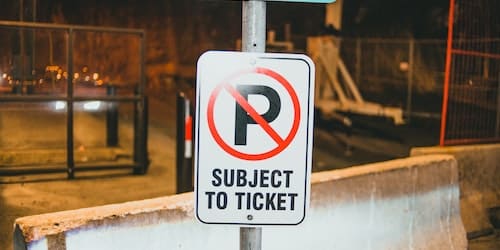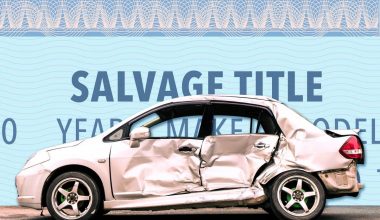In general, parking tickets do not affect your insurance rates. Parking tickets are considered non-moving violations, meaning they are unrelated to your driving ability. When setting rates, auto insurance companies typically only consider moving violations, such as speeding tickets and DUIs.
However, there are a few exceptions to this rule. In some states, unpaid parking tickets can lead to a suspended driver’s license. If your driver’s license is suspended, your insurance company may cancel your policy or raise your rates.
But there is more, which will be covered in the course of this article, along with other vital information you should be aware of to avoid incurring additional charges with your insurance company.
How is a Parking Ticket Different from a Moving Violation?
A parking ticket is a citation issued to a vehicle owner for violating parking regulations. Parking tickets can be issued for various reasons, such as parking in a prohibited area, exceeding the time limit for a metered parking space, or not displaying a valid parking permit.
A moving violation is a traffic citation that is issued to a driver for violating a traffic law while the vehicle is in motion. Moving violations can include speeding, running a red light, or driving under the influence of alcohol or drugs.
The main difference between a parking ticket and a moving violation is that a parking ticket is not considered a driving offense. This means parking tickets do not typically appear on your driving record and will not affect your insurance rates.
When Parking Tickets Affect Insurance Rates
Parking fines are non-moving offenses. Therefore, they usually have no effect on your auto insurance rates—at least not immediately. For example, if you fail to feed the meter or park in the wrong place, you may receive a parking charge. Fortunately, these tickets are not usually tied to your driver’s license, reported to your state’s DMV, or disclosed to your motor insurance company. If you do not pay for these types of tickets within the prescribed time range, your insurance prices may rise.
Do Parking Fines Affect the Cost of Insurance?
A parking ticket is unlikely to increase your vehicle insurance price, but unpaid parking citations sent to collections may have an impact on your credit-based insurance score. Some car insurance companies will look at your credit score to determine whether or not to insure you and the cost of your car insurance. This means that unpaid parking citations may have an impact on your premium.
However, rules prohibit vehicle insurance firms from utilizing credit scores when determining rates in some states, including California, Hawaii, Maryland, Massachusetts, and Michigan. In that sense, unpaid parking fines will unlikely affect your auto insurance rates.
How to Avoid Having Parking Tickets Raise Your Insurance Rates
If you receive a parking ticket, it is usually in your best advantage to handle the situation as soon as possible. If you do not pay your ticket on time, you may incur late fines, or the city may confiscate your vehicle.
Instead of ignoring a ticket, consider the following alternatives:
- If you believe the ticket was issued in error, send a letter to the municipality as quickly as possible explaining why you believe the ticket was unjustified under the circumstances. Include a copy of the ticket, your contact information, and any supporting documentation, such as photos of the broken meter or the partially covered or damaged “no parking” sign.
- If you cannot pay the ticket immediately, speak with the city or county about a payment plan or other arrangements. The city may be able to block more late fees so that you may catch up on unpaid fines.
- Request a loan from a family member or friend to cover the ticket cost. You can repay your family without worrying about further late fees or collections.
- Request a pay advance from your company to settle your parking penalty.
How to Avoid Parking Tickets
- The best way to avoid parking penalties is to be cautious about where you park. Examine local signs to confirm that you can park in the area. Some localities impose time restrictions or only allow parking at certain times of the day or on certain days of the week.
- Bring lots of coins if you’re parking in a metered location, and keep track of how much time you’ve paid to park. Setting a timer on your smartphone is a wonderful way to remember. Remember to allow yourself a few more minutes to return to your car or to add more coins to the meter.
- If you park in an area with a broken parking meter, you may have difficulty establishing to the local parking official that the meter is defective. If possible, you should try parking elsewhere in this scenario.
- Finally, if you receive frequent parking penalties at home or near work, you could consider making alternate arrangements, such as renting a garage parking space, requesting parking help from your employer, or taking public transportation instead.
Other Consequences of Parking Tickets
While parking fines normally have no effect on vehicle insurance premiums, here’s what could happen if you don’t pay them:
#1. A Boot on the Tire
Some municipalities may put a boot on your vehicle’s tire to prevent it from moving until the tickets are paid. In addition to the ticket price, you must pay someone to remove the boot, which can cost up to $136 in major metropolitan locations such as New York City.
#2. Fees for Late Payments
Late costs on unpaid parking tickets can be costly. If you do not pay your citation on time, you may be charged a substantial late fee – in certain cases, double the initial fine. Certain jurisdictions are legally limited in how much they can charge in late fees, but you may not want to risk incurring past-due costs on your violations.
#3. Being Towed
If your automobile is towed and confiscated after receiving a bunch of parking fines, be prepared to spend a lot of money to get it back. If your automobile gets impounded in New Orleans, for example, you’ll most likely have to pay numerous fees to get it released, including your parking ticket(s), a storage fee of $19 per day (up to $500), and a towing fee of $161.25.
What Kind of Tickets Have an Impact on Your Insurance?
Moving infractions and nonmoving violations are the two types of traffic tickets. Moving infractions, such as speeding, impact your insurance since they indicate how safely you drive. Non-moving offenses, such as parking, normally do not affect your insurance.
Can You Lose Your License Because of a Parking Ticket?
You cannot lose your license only because of parking citations, no matter how many you have. However, in some areas, failure to pay parking penalties can result in the loss of your driver’s license. Other states, such as New York, have passed legislation to protect drivers from losing their licenses due to unpaid penalties.
How Can You Know If You Have Outstanding Parking Tickets?
Many states provide an online system where you may enter your license plate number to see if you have any outstanding parking citations. If you have one and cannot pay it, ask whether a payment plan is available. You should be aware that you may pay extra if you choose to pay your parking ticket through a payment plan.
What Effect Does Texting and Driving Have on Insurance?
State law determines it. Some states prohibit insurance companies from using texting tickets when determining rates. In jurisdictions where it is not prohibited, insurers may treat them as minor moving offenses, which could result in a rate increase.
Is a Red-Light Ticket Going to Affect My Insurance Rates?
If you receive one of those dreaded red-light camera fines in the mail, your insurance premiums may or may not increase. It depends on how your state handles texting tickets, much like it does with speeding fines. Some states officially prohibit insurance companies from utilizing red-light camera fines to determine rates, while others see them as minor driving offenses that may result in a rate hike.
Do Out-Of-State Tickets Have an Impact on Insurance?
Yes, fines received while driving out of state might raise your insurance premiums. However, depending on how the state or your insurer handles the violation, your rate may vary minimally or not at all. If you receive an out-of-state ticket, the best thing you can do is pay the fine. Otherwise, the next time you pass through that state, you may be arrested.
Will a DUI Raise My Insurance Rates?
Yes. DUI convictions always raise your insurance price since they make you a riskier customer to insure. Some insurance companies will not even sell a coverage to someone who has a DUI. Find out more about DUIs and insurance.
What Effect Do Speeding Tickets Have on Insurance?
If you acquire two or more speeding fines in three years, your insurance rates will almost certainly rise. If you receive your first and only speeding ticket during this time period, your insurance may not increase at all. Numerous factors, such as your insurance provider, driving history, insurance history, and, in some jurisdictions, how fast you were driving when you received a ticket, will affect the amount of your rate increase.
What Is the Duration of a Speeding Ticket on Your Driving Record?
Depending on how long your state retains violations on their records, speeding citations may be removed from your driving record within 3-5 years. When you get a quote, most vehicle insurance companies will also ask about any speeding fines you’ve had in the past.
Do Parking Citations Have Any Effect on Your License?
Parking citations will not affect your driver’s license status if you pay them. If you do not pay your parking fines, the DMV may suspend your license or prevent you from renewing it. You may not be able to renew your vehicle registration, depending on how many unpaid parking citations you have.
- WORK TICKET: Meaning, Template & How it Works
- TICKET MANAGEMENT SYSTEMS: Best Free and Paid Options In 2023
- ISSUE TRACKER: Top 10+ Best Tracker App, System, & Software
- PLAGIARISM IN THE WORKPLACE: Why and How to Avoid It
- HOW TO GET A SPEEDING TICKET OFF YOUR RECORD IN DIFFERENT STATE






